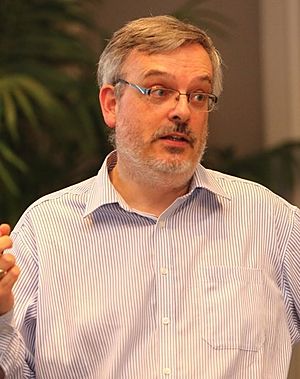Nigel Scrutton facts for kids
Quick facts for kids
Nigel Scrutton
FRS FRSB FRSC
|
|
|---|---|
 |
|
| Born |
Nigel Shaun Scrutton
2 April 1964 |
| Nationality | British |
| Citizenship | British |
| Alma mater |
|
| Awards |
|
| Scientific career | |
| Fields | Biological Chemistry, Biophysics, Biotechnology, Synthetic Biology, Quantum Biology |
| Institutions | |
| Thesis | Mechanistic and structural studies on glutathione reductase by protein engineering (1988) |
| Doctoral advisor | Richard Perham |
Nigel Shaun Scrutton, born on April 2, 1964, is a British scientist. He is famous for his work in biochemistry and biotechnology. Biochemistry is the study of chemical processes in living things. Biotechnology uses living systems to create products. He has made important discoveries about how enzymes work, how living things use physics (biophysics), and how to design new biological systems (synthetic biology).
Professor Scrutton leads big research centers in the UK. He is the Director of the UK Future Biomanufacturing Research Hub. He also directs the Fine and Speciality Chemicals Synthetic Biology Research Centre (SYNBIOCHEM). He helped start a company called C3 Biotechnologies Ltd, which works on making fuels from biology. He is a professor at the University of Manchester. From 2010 to 2020, he was the Director of the Manchester Institute of Biotechnology (MIB).
Contents
Early Life and Education
Nigel Scrutton was born in Batley, a town in West Yorkshire, England. He grew up in Cleckheaton and went to Whitcliffe Mount School.
University Studies
In 1985, Scrutton earned a top degree in Biochemistry from King's College London. He then went to St John's College, Cambridge for his PhD. He finished his doctoral research in 1988, guided by Professor Richard Perham.
After his PhD, he continued his research at St John's College. He was also a Fellow and Director of Studies at Churchill College in Cambridge. In 2003, the University of Cambridge awarded him a Doctor of Science (ScD) degree. This is a very high academic honor.
Career and Research
After his studies, Professor Scrutton became a Lecturer at the University of Leicester in 1995. He quickly moved up, becoming a Reader in 1997 and a Professor in 1999. In 2005, he joined the University of Manchester as a Professor.
Key Research Areas
Professor Scrutton has spent many years researching how enzymes work. Enzymes are like tiny biological machines that speed up chemical reactions in living things. He has also studied the structures of enzymes and how light affects proteins.
His team has done important work on quantum tunnelling in enzymes. This is a complex idea where tiny particles can pass through barriers. They also study how proteins move and change shape during reactions. This research helps us understand how enzymes are so efficient.
Contributions to Science
Professor Scrutton has also made contributions to other areas. These include enzyme kinetics, which is the study of how fast enzymes work. He has also worked on protein engineering, where scientists design new proteins. His work includes directed evolution, which is like speeding up natural selection in a lab.
He has also been a leader in synthetic biology. This field involves designing and building new biological parts or systems. For example, his team has created ways to engineer microorganisms. These tiny living things can then produce useful chemicals like fuels or medicines.
Funding and Students
His research has received funding from various organizations. These include the Engineering and Physical Sciences Research Council and the Biotechnology and Biological Sciences Research Council. He has guided about 70 students through their PhDs. He has also worked with about 60 postdoctoral researchers. Professor Scrutton has published over 500 research papers.
Leading Research Centers
In 2015, Professor Scrutton helped start C3 Biotechnologies Ltd. This company aims to turn his research into real-world products. These products include chemicals, fuels, and materials.
He also founded the Manchester Synthetic Biology Research Centre SYNBIOCHEM in 2014. This center received a lot of investment from the UK government. In 2019, he started the UK Future Biomanufacturing Research Hub. This hub develops new technologies for making bio-based products in the UK. These products are used in medicines, chemicals, and engineering.
Under his leadership, the Manchester Institute of Biotechnology (MIB) received a special award. It won the Queen's Anniversary Prize for Higher and Further Education. This award recognized MIB as a leader in biotechnology and bio-manufacturing.
Awards and Honours
Professor Scrutton has received many awards for his scientific work.
Major Awards
- In 1999, he was awarded the Colworth Medal from the Biochemical Society.
- He received the Enzyme Chemistry Award (Charmian Medal) from the Royal Society of Chemistry in 2002.
- In 2009, he won the Rita and John Cornforth Award from the Royal Society of Chemistry.
- He was given the Interdisciplinary Prize from the Royal Society of Chemistry in 2019.
Fellowships
Professor Scrutton has also been recognized by several important scientific societies:
- He became a Fellow of the Royal Society (FRS) in 2020. This is one of the highest honors for a scientist in the UK.
- He was elected a Fellow of the Royal Society of Chemistry (FRSC) in 1996.
- He became a Fellow of the Royal Society of Biology (FRSB) in 2009.
- He was made a Member of the Lister Institute in 2004.
Personal Life
Nigel Scrutton married Nia Francis Roberts in 1989. They have two sons and one daughter.

